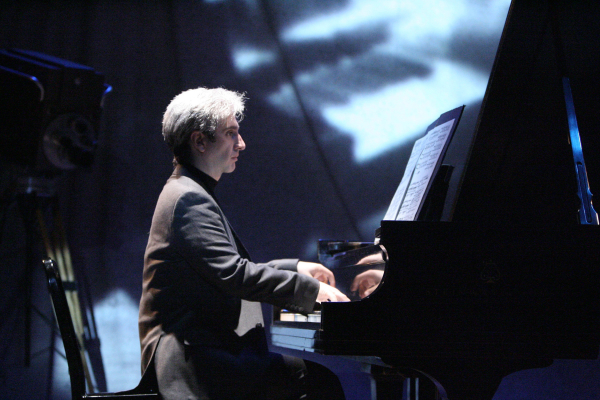In Maestro Bernstein, Hershey Felder Embodies the Famed West Side Story Composer
And he reveals why Bernstein would have found this headline infuriating.
During his single performance of Maestro Bernstein at Town Hall on July 17, Hershey Felder will bring the legendary Leonard Bernstein to life through music and dramatic performance. Felder is uniquely suited to this task, and not just because he's previously taken on solo-shows about everyone from George Gershwin (on Broadway in 2001's George Gershwin Alone) to Abraham Lincoln. In addition to his acting skills, Felder is a concert pianist, successful writer, and director.
With so many outlets available to him, Felder explains his specific interest in playing Bernstein, his love of the one-man format, and the thing he really loves to do.

(courtesy of the production)
You wear so many hats. What do consider yourself artistically?
Insane. [laughs] The truth of the matter is that one of the things that I discovered long ago was not to make myself into this or that or the next thing. It is what it is. Whatever [the work] demands is what I do.
What draws you to embodying historical figures?
What seems to be this common through-line is regular people, or seemingly regular people…making a difference in the world. I think what interests me is the notion that somebody who has something – talent, commitment, and so on – can actually do something really spectacular and wonderful for the world. You have Gershwin, who was the son of immigrants and who had no reason to be what he was – other than he was what he was. You have Chopin, who was born in Poland on a farm. You have Beethoven, who was really just the son of a very not good choral conductor and organist. None of them were dynastic characters…but there's something very touching about that. That it's possible [for them], I think, is what means something.
What do you appreciate about the one-man show format?
The audience appreciates direct address for these kinds of things. They want these characters to talk to them…And it's less a one-man show than it is a character talking to his audience the way these characters would. Chopin talks to his students, Bernstein talks to his music audience, which is what he did. So that gives both a real gravitas and also natural place for these characters to live.
How do you work music into the show?
Well, it's part of a real story. So in a simple example, Bernstein tells the very funny story of giving his concerto debut to the school orchestra when he was 14 years old at Boston Latin of all places, and this gives him the opportunity to actually demonstrate what he did that evening. [So] you hear the opening of a Grieg concerto and why it meant so much to him. So it's not only what he did, but it's why it happened, why it influenced him, and what the music actually means.
One of the wonderful awful moments that gets a marvelous laugh is when he's discussing Gershwin's Rhapsody in Blue, which was one of his influences. He says, "Well, it's not really much of a piece. It's just a bunch of hit tunes in search of a composition." Which is a terrible thing to say, but very funny. And he said it! But it says so much about him and so much about his being opinionated.
What makes Bernstein special?
The thing about Bernstein, and what's wonderful dramatically, is that he was complicated. There's a lot of self-questioning. The piece is based on something that actually happened. He died thinking that people would only remember West Side Story, and he thought he had a lot more to leave behind…I think it disturbed him at the end that [West Side Story] is what everybody talked about. It drove him crazy. And it gets hard to be generous about that. When you're dying and when you're sick, thinking that that's going to be your legacy when there's a whole lot more is probably complicated. So that's what the piece is based on. That to me was a very interesting character study.
He was also the first media star of that sort. It's fascinating to look back at that life and realize what happened to him and…that changed the way the entire world looked at this kind of music.
Do you ever see yourself getting tired of pursuing these kinds of character studies?
I do other things too. There's directing. A show that I adapted and directed, The Pianist of Willesden Lane, is opening at 59E59 in New York. And I've got new shows coming up. So there's all these things going on. It's never dull. But I don't think I'll ever get tired of doing what I really love to do, which is talking to the audience.









